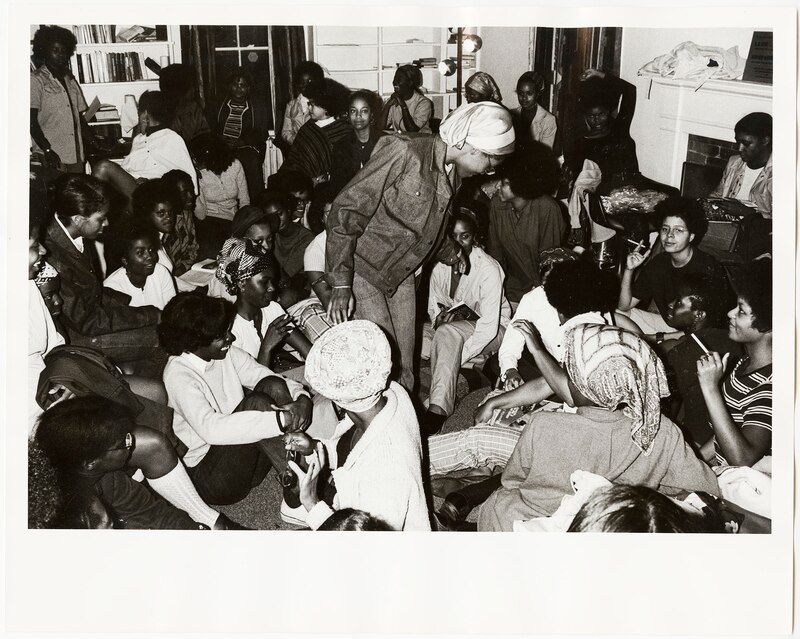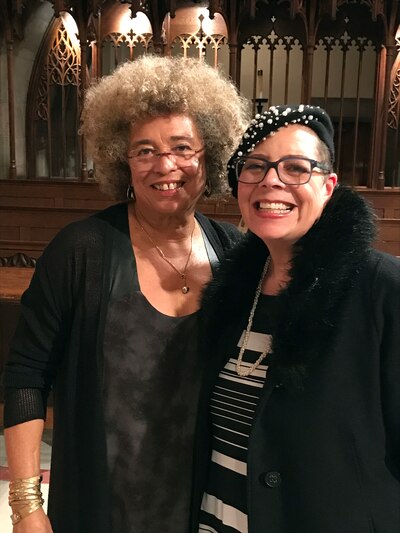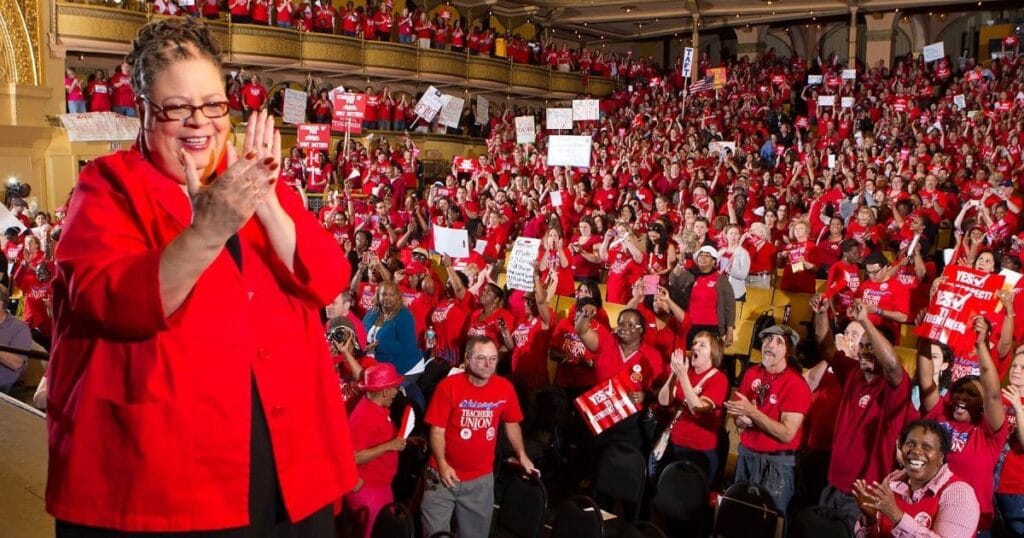Sign up for Chalkbeat Chicago’s free daily newsletter to keep up with the latest news on Chicago Public Schools.
It’s been four years since Chicago Teachers Union President Karen Lewis died at the age of 67. Now, a new book shares her life story in her own words.
Co-written by Lewis and former Chicago school board member and historian Elizabeth Todd-Breland, “I Didn’t Come Here to Lie: My Life and Education” chronicles Lewis’ life from her childhood growing up in Chicago’s Hyde Park, to her twenties working a multitude of jobs, to her years leading the CTU.
“She was very clear-eyed about how she wanted to tell the story,” Todd-Breland said, adding that when people who knew her well read the book, they’ll say, “I can hear her in it.”
After decades teaching high school chemistry at Chicago Public Schools, Lewis joined a group of progressive educators to form the Caucus of Rank and File Educators in 2008. The group pushed back on bipartisan education reform efforts of the time that came with high-stakes accountability, the closure of many traditional public schools, the firing of veteran educators, and the rise of publicly-funded, privately-run charter schools in Chicago.
The group took over leadership of the CTU in 2010 and popularized a common good approach to organizing and bargaining that centered social issues and pushed to have teachers’ voices shape public education policy. Teachers unions in Los Angeles, Milwaukee, Seattle, Saint Paul, Minnesota, and Dayton, Ohio, eventually followed the approach.
Lewis sparred publicly with former Chicago Mayor Rahm Emanuel over the length of the school day and year, whether teacher evaluations should be linked to student test scores, and air conditioning in classrooms. She led a seven-day strike in 2012 that was bruising to Emanuel and launched Lewis into the national spotlight.
In 2015, she was diagnosed with a brain tumor just as she was considering a challenge to then-Mayor Rahm Emanuel. Though she recovered and remained at the helm of the CTU, a stroke in the fall of 2017 led to her resignation from the union’s top role in 2018.
Todd-Breland began working with Lewis on her memoir in early 2017. After the stroke, she couldn’t write anymore, Todd-Breland said, so she began interviewing Lewis at CTU headquarters, in her home, and eventually, at Whitehall, an assisted living facility in suburban Deerfield. Their last interview took place in February 2020, and Lewis passed away roughly one year later.
Todd-Breland worked with research assistant Sekordri Ojo, who was also a student of Lewis’s when she taught chemistry at King College Prep, to put the book together “like a puzzle” to create a cohesive narrative about a woman she calls “a master teacher, a skilled communicator, a principled person, and a renaissance woman.”
Chalkbeat spoke to Todd-Breland about the book.
This interview has been edited for length and clarity.
One thing that really stuck with me was her recollection of going to school for the first time and coming home from the first day of kindergarten and being devastated that she wasn’t taught to read. Was that surprising to you?
That’s a good question. I think it wasn’t surprising to me because Karen was so precocious and so curious that, of course she would expect on the first day of kindergarten to learn how to read.
But I think some of the other things that she talks about are actually interesting and speak to the moment that she went to elementary school. For example, she talks about primary grade teachers playing the piano and teaching music in the classroom. That was something that was quite widespread during that period of time. Primary grades included music in the classroom or had pianos.
As a side note, I recall I was doing some work years ago with some students at Sumner Elementary School on the West Side in an after school program. We were working on a history project about their school and we found all these old pianos. And I remember asking, “What is this about?” And they were like, “Yeah, primary grades used to have pianos and teach music in class.” I think that is sort of something of the era.

After graduating from Dartmouth College, Lewis moved to Oklahoma, where she held so many different jobs that weren’t teaching jobs. She led this entire other life before the one we know about in Chicago. Was it difficult for her to talk about this time in her life?
I think it was a time of a lot of growth for her. Her years in Oklahoma. In a certain way, it almost felt like she was fleeing Dartmouth. I think it was very hard to be among the only Black women, very few Black people, at a time when this university had just turned coed, and I think she was ready to get out of there.
She was trying to figure out what she wanted to do with life. She worked at a drug rehab center. She worked at American Airlines. She was doing IT work. She sold Ginsu knives. She did telemarketing, which she said was actually one of her favorite things, before she found teaching. I think she really was just kind of trying to find her way, which is what a lot of people do.
She does remark on how, particularly coming from Chicago, it felt like the civil rights movement was several years behind in Oklahoma. She really felt like folks there were, in many ways, still traumatized, particularly in Tulsa, by the Tulsa race massacre that had happened earlier in the 20th century. In Tulsa, they knew what happened, they experienced very viscerally the negative consequences of fighting white supremacy, and so she felt like there wasn’t as much of a desire to aggressively confront racial inequality there in the same way she had experienced in Chicago, or even what she experienced as a student activist in her college years.
She talks about her first husband, Glenn, who she married while in Tulsa. The two split and he died at 41 when Lewis was 35, but she said Glenn taught her that “people you work with aren’t necessarily your friends. He taught me how to read between the lines. He gave me all the street smarts that I think I have now.” Decades later, Chicago Magazine wrote a profile of her characterizing her as a street fighter. Did getting this glimpse into her life in Oklahoma help you better understand that side of her?
I think that there are parts as she narrates her early life that you can still see in her later life. On the one hand, she was a singular, extraordinary person. On the other hand, she was a human and I think one of the things that the memoir does is in telling her personal story of growth over time, of learning and seeking and trying things and shifting, it also humanizes her in a way that I think hopefully also allows people to see that not that anyone can do extraordinary things, necessarily, but that we all have the capacity within us to try to do hard things.
In the book, Lewis references civil rights lawyer Lani Guinier a few times. She outlines three questions she used in her D’vah Torah that she credits to Guinier: “Who made the rules to the game? Who are the winners, and who are the losers? What are the stories the winners tell the losers to keep them playing the game?” How do you think this applies to public education today?
I think as we look particularly at the national political landscape right now, those questions remain really important. And Lani Grieuner was “she-ro” of Karen’s. She was also a Black Jewish woman. She was a civil rights lawyer. She faced her own pushback for pushing the envelope, and ultimately wasn’t able to be nominated for the position [of U.S. assistant attorney general for civil rights under Bill Clinton], or go forward in her nomination.
I think these questions are basically: What is common sense? I think if we look at the period between the early 2000s and now, the education justice movement that Karen was a prominent leader in shifted that common sense locally about things like the need for fully funded education, the values of having an art teacher, a music teacher, and physical education and wraparound services. These aren’t things in our common sense today that we question. Whereas if we think back to the late ’90s and the early 2000s, it was a back-to-basics moment. It was a kill-and-drill moment, it was double-block English, double-block math and everything else goes to the wayside.
If you think back to the early 2000s, there was really bipartisan consensus around privatization, high stakes testing, high stakes accountability. The polarities are now quite different. On the one hand, you have leaders on the right who want to privatize everything, voucher out the education system, defund public education. But the alternative to that isn’t “Let’s do some form of pseudo-privatized education,” or “hard a” accountability. The alternative to that is: fully funded schools, wraparound services, culturally relevant and responsive education. In this moment, the force of narrative that those three questions point to remains relevant.
What do you think she would think about former teacher and CTU organizer Brandon Johnson getting elected Chicago mayor and now being on the rulemaking side and the winning side?
If you think back to the political project that she was engaged in, she very clearly saw a path into electoral politics for herself, potentially being mayor, but also pushing different candidates to really change the playing field. I think she would be proud of now-Mayor Brandon Johnson for stepping into that arena.
I also think she was clear eyed about the difficulties of governance that everyone encounters. Particularly in the moment we’re in right now, taking on political roles at a moment when, in particular, funding is falling out from underneath all of us, is a really daunting and difficult task.
I don’t want to put words into Karen’s mouth, but what I can say based on the conversations that we did have, and what she writes about, is that she did think it was important to move into electoral politics, regardless of how fraught that space might be.
Was there anything cut from the book, or did you have a hard time distilling it down?
I had a ton of material. When I started, the first draft had like 110,000 words. It was wildly large. But part of that is because there’s repetition.
I do think that there were — there’s not key things that I was like, “Wow, I wish I could put that in.” But there were things that, if she were still living, I would have loved to press more on. Like, tell me more stories about the classroom, because her stories about the classroom were amazing. Lighting things on fire on the first day of school in chemistry class to get students engaged and about her use of the Socratic method that she learned actually at Sullivan in her very first fulltime teaching job and how she used that and it resonated with her own liberal arts education at Mount Holyoke and Dartmouth.
She taught for so long, over 20 years, in one of the largest high schools in Chicago, Lane Tech College Prep, as well as King College Prep and Sullivan High School. Her students are everywhere. They come out of the woodworks to share stories about their experiences with Karen, how transformative she was in their lives. Just like a LinkedIn post like, hey, the book’s out and I have former students commenting “I remember when I was in class and you know, she said this and that changed my life,” and I think it does speak to the transformative power of educators. In the day to day, it can often feel futile and frustrating, but teachers are shaping and molding and impacting people’s lives in a way that travels with them for the rest of their life. And I think Karen was one of those educators.
Lewis talks about former Mayor Rahm Emanuel, with whom she had an adversarial relationship at times, and how she read the book “Brothers Emanuel,” in order to know her enemy as a form of opposition research. What were her reflections on that relationship?
I think her critiques of Rahm Emanuel were very pointed. I think her critiques of the relationship that he thought he could establish with her and her putting a check on how she would and would not be spoken to, she was very clear on that.
There’s the sort of interpersonal parts of her relationship with Rahm Emanuel, but for her it wasn’t strictly interpersonal. For her, when we talk about the winners and the losers in the game, she represented generations of educators and students who had been on the losing end of things for so many years. And so when she was in these back and forth conversations with him, she wasn’t there by herself. She was there on behalf of many, many people who had for many years not been or not had opportunities in the city. It felt like something more than just an interpersonal attack to her. When you cuss at me or when you put me down, in this way, you’re also putting down all the people that I represent here.

In the book, she also talks pointedly about party politics and money, saying, “We have a one party system in America, and it’s the party of money. There are just two major branches, Democrats and Republicans. And if you don’t believe it, look at who the donors are. Those donors will subsidize both branches. What we really have is one party, the party of green. And I don’t mean the environmentalist green. I mean the party of money green. This is my theory of the situation. Of course, I could be wrong as all get out.” Do you think she was wrong?
I don’t think she was wrong. I think there are so many things in this memoir and her lessons for us that speak to exactly where we are today, fighting against billionaires, using the word oligarchy profusely in the United States of America, and having it accurately reflect the power structure of our country. I think she was very keen to that issue.
She talked about how she didn’t see that much of a difference between former Illinois Gov. Bruce Rauner, a Republican, and Emanuel, a Democrat, or these other billionaires that were pulling the strings behind the curtain, and that the answer to that, for her, was people power. That the power of the people, the power of mass mobilization, the power of solidarity, was the only thing that could push back and fight against that, and that’s where we are today.
Her faith was a big part of the whole book. She talks in the very final chapter, A Life Well Lived, about running into people who had wanted her to be the mayor and telling them, “God had something else planned for me. What are you going to do?” In your last interview, obviously, you probably didn’t know it was your last. Did you know it was your last?
No. No, definitely not.
Was it hard for you to figure out where to finish the story?
We weren’t able to communicate much during that COVID year and towards the very end of her life, but Karen’s faith was so important to her, and I think it was something that sustained her through difficult and joyful moments. She would say to me regularly, “I plan to live for another 100 years.” She had a different vision for herself. I think she was someone who also had a very forward-looking vision and that that sustained her in a certain way, and that her faith was a central part of that.
It actually was very difficult trying to figure out how to end the book, because when we were working on the book, she was alive. So trying to figure out how to end it was difficult. Every time I read it, it was hard when I’d get to the end, because it felt like, oh, our time together is over.
On the one hand, she had so much more in her, and on the other hand, she did so much. One thing I will say is, given the attacks on DEI, given the attacks on public education, given the defunding or deconstruction of the U.S. Department of Education, Karen’s words and ideas are as relevant today as they were in the 2000s and 2010s. I hope that people can take strength from her story — to laugh and to learn and to think about how we fight for a better world and for the world that our students deserve and our communities deserve.
Becky Vevea is the bureau chief for Chalkbeat Chicago. Contact Becky at bvevea@chalkbeat.org.
Becky Vevea 2025-04-21 10:00:00
Source link

